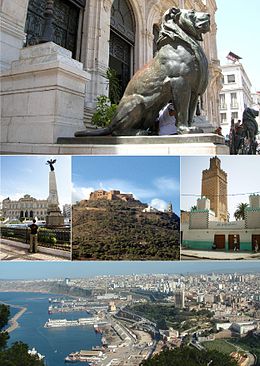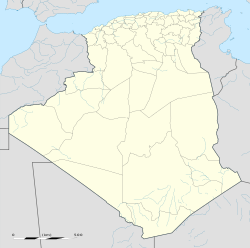El Hamri
|
Oran ⵡⴻⵂⵔⴰⵏ / Wahrān / وهران |
||
|---|---|---|
| City | ||

Top, the two Lions of Atlas (symbol of Oran), Center, 1st November Place, fort & chapel of Santa Cruz, Bey Othmane mosque, Bottom, general view
|
||
|
||
| Nickname(s): The radiant " الباهية " | ||
 Location of Oran in the Oran Province |
||
| Location of Oran within Algeria | ||
| Coordinates: 35°41′49″N 0°37′59″W / 35.69694°N 0.63306°WCoordinates: 35°41′49″N 0°37′59″W / 35.69694°N 0.63306°W | ||
| Country |
|
|
| Province | Oran Province | |
| District | Oran District | |
| Re-founded | AD 944 | |
| Government | ||
| • Wali (Governor) | Saddek Benkada | |
| Area | ||
| • City | 2,121 km2 (819 sq mi) | |
| Elevation | 0.9 m (3 ft) | |
| Population (2008 for city proper, 2010 for metro area) | ||
| • City | 1,560,329 |
|
| • Metro | 3,454,078 | |
| Time zone | CET (UTC+1) | |
| Postal codes | 31000 - 31037 | |
Oran (Arabic: وهران, Wahrān; Berber: ⵡⴻⵂⵔⴰⵏ) is a coastal city that is located in the north-west of Algeria. It is considered the second most important city of Algeria after the capital Algiers, due to its commercial, industrial, and cultural importance. It is 432 km (268 mi) from Algiers. The total population of the city was 759,645 in 2008, while the metropolitan area has a population of approximately 1,500,000 making it the second largest city in Algeria.
The name "Wahran" (Oran in Arabic) is derived from the Berber word "uharan" that means "two lions".
A legend says that in 900 AD, lions still lived in the area. The last two lions were hunted on a mountain near Oran and are elsewhere referred to as "mountain lions".
The word derives from the Berber root hr, meaning lion (see also Tahert and Souk Ahras). The name is attested in multiple Berber languages, for instance as uharu and ahra. A locally popular legend tells that in the period around 900 AD, there were sightings of lions in the area. The two last lions were killed on a mountain near Oran, and it became known as La montagne des lions ("The Mountain of Lions"). Two giant lion statues stand in front of Oran's city hall, symbolizing the city.
During the Roman empire, a small settlement called Unica Colonia existed in the area of current Oran, but this settlement disappeared after the Arab conquest of the Maghreb.
Present-day Oran was founded in 903 by Moorish Andalusi traders. It was captured by the Castilians under Cardinal Cisneros in 1509, and Spanish sovereignty lasted until 1708, when the city was conquered by the Ottomans. Spain recaptured the city in 1732. However, its value as a trading post had decreased greatly, so King Charles IV sold the city to the Turks in 1792. Ottoman rule lasted until 1831, when it fell to the French.
...
Wikipedia


